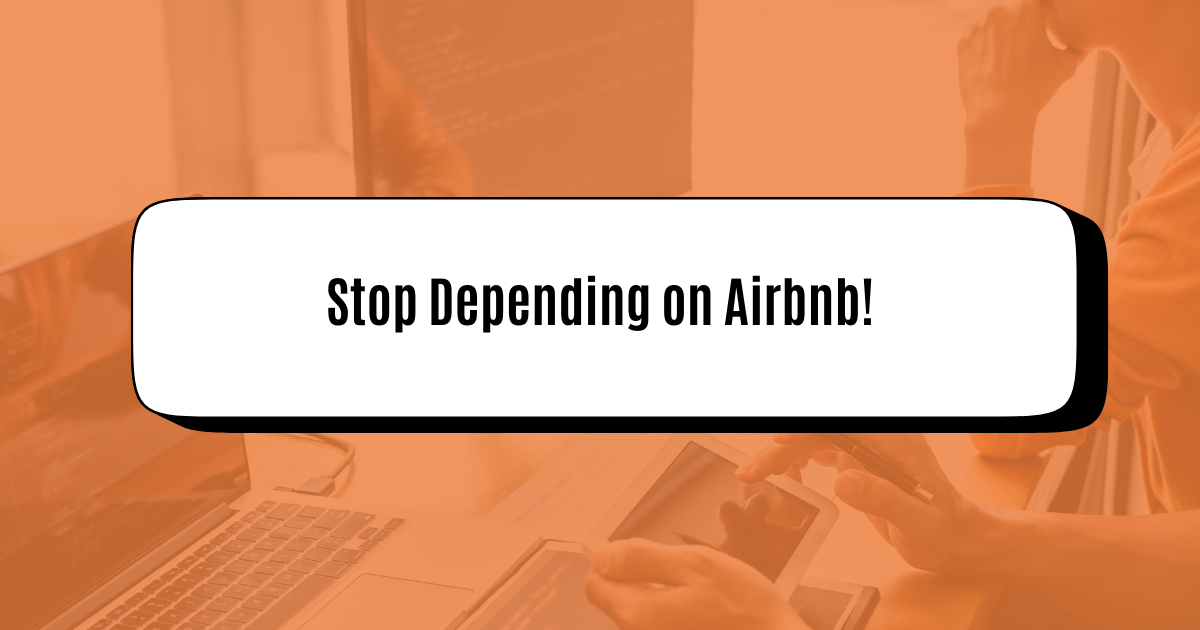Many hosts depend on Airbnb for bookings, but that reliance comes at a cost. Platform fees cut into profits, and strict rules limit flexibility. The most effective way to keep more income and gain control is by driving direct bookings.
With a direct booking strategy, hosts set their own policies, keep guest information, and build stronger relationships that lead to repeat stays. A well-designed website, clear communication, and smart marketing create a booking process that feels just as simple as Airbnb—without the extra fees.
This approach not only protects income but also strengthens long-term business stability. By learning how to set up a direct booking system, improve guest experience, and promote a property beyond third-party sites, hosts position themselves for steady growth and independence.
Why Direct Bookings Matter for Your Rental Business
Direct bookings give property owners more profit, stronger guest connections, and greater control over how their rental business operates. They reduce dependence on third-party platforms and create a more sustainable way to manage income and guest experiences.
Keep More Profit by Avoiding Commission Fees
When guests book through platforms like Airbnb or Vrbo, owners pay commission fees that often range from 10% to 20% of each reservation. These costs quickly add up, especially for high-demand properties or longer stays.
By encouraging direct bookings, owners keep that money in their business. For example, a $2,000 booking with a 15% commission fee means $300 lost to the platform. Direct reservations eliminate that loss and increase net income.
Extra profit can be reinvested into the property. Owners can use it for upgrades, better amenities, or marketing that attracts more guests. This creates a cycle where savings from avoiding fees directly improve the guest experience and long-term revenue.
Even a small shift toward direct bookings can make a noticeable difference. If half of the reservations come directly, the annual savings can equal thousands of dollars in extra earnings.
Build Stronger Guest Relationships and Loyalty
Direct bookings allow hosts to communicate with guests before, during, and after their stay without platform restrictions. This open communication helps answer questions faster, set clear expectations, and build trust.
When guests feel cared for, they are more likely to return. Repeat bookings are valuable because they reduce the need for constant advertising or reliance on listing sites.
Owners can also gather guest contact details, such as email addresses, to send updates, discounts, or seasonal offers. This creates a direct marketing channel that encourages loyalty.
A guest who books directly often feels a stronger connection to the property and host. Over time, this loyalty can turn into consistent repeat stays and referrals to family or friends.
Gain Control Over Policies and Guest Experience
Third-party platforms set many of the rules for cancellations, refunds, and communication. This limits how owners manage their rental business. Direct bookings remove those limits and allow owners to set policies that fit their needs.
For example, they can offer flexible check-in times, custom cancellation terms, or special discounts for longer stays. These adjustments often make the property more appealing and competitive.
Direct control also improves the guest experience. Owners can personalize stays with welcome messages, local tips, or tailored services without worrying about platform restrictions.
By managing policies and communication directly, owners ensure consistency in service and protect their brand. This independence makes the rental business more resilient and less vulnerable to sudden changes in platform rules or fees.
Setting Up Your Direct Booking Website
A direct booking site gives property owners more control over reservations, guest communication, and long-term profits. To build one that works well, they need the right tools, a professional design, and secure systems for payments and policies.
Choosing the Right Website Builder
The first step is selecting a website builder that supports booking features. Popular options include Lodgify, Guesty, and WordPress with booking plugins. These platforms allow hosts to manage calendars, sync with OTAs, and accept reservations directly.
When choosing, they should look for:
- Ease of use (drag-and-drop design, no coding needed)
- Mobile-friendly templates
- Integration with payment processors
- Channel management to avoid double bookings
A good website builder should also provide customer support and regular updates. This ensures the booking website stays functional and secure as technology changes.
Creating a Professional Booking Website
Guests expect a direct booking website to look trustworthy and easy to use. Clear navigation, high-quality photos, and simple booking steps matter more than flashy design.
Key elements to include:
- Property descriptions with accurate details
- Pricing and availability calendar updated in real time
- Contact options such as phone, email, or chat
- Guest reviews or testimonials for credibility
It also helps to add local information, such as nearby attractions or transport details. This makes the booking site more useful and encourages guests to book directly instead of going back to Airbnb.
Ensuring Secure Payments and Legal Compliance
A direct booking site must handle payments safely. Using trusted providers like Stripe, PayPal, or Square protects both the guest and the host. The payment system should support credit cards, refunds, and deposits.
Legal compliance is just as important. Owners should display terms and conditions, cancellation policies, and privacy notices on their website. Adding an SSL certificate also ensures that guest data is encrypted.
In some regions, short-term rentals require licenses or tax collection. Hosts should confirm local rules and make sure their booking website reflects those requirements. This prevents disputes and builds guest confidence.
Optimizing Guest Experience and Communication
Direct bookings increase when guests feel informed, valued, and rewarded. Clear communication, smooth scheduling, and thoughtful perks make the booking process easier and the stay more enjoyable.
Automating Guest Messaging and Calendar Sync
Automated guest messaging saves time and ensures no inquiry goes unanswered. Hosts can set up messages for booking confirmations, check-in instructions, and reminders. This reduces confusion and provides guests with the details they need without delay.
A synced calendar across platforms prevents double bookings and scheduling errors. When availability is always accurate, guests can book directly with confidence.
Automation tools also allow quick responses to common questions. For example, automated replies can cover Wi-Fi details, parking options, or directions. This creates a consistent guest communication process while freeing the host to focus on service.
| Automation Benefit | Guest Impact | Host Impact |
|---|---|---|
| Instant confirmations | Builds trust | Reduces manual work |
| Synced calendar | Accurate availability | Prevents double bookings |
| Scheduled reminders | Clear expectations | Fewer last-minute issues |
Offering Exclusive Perks for Direct Bookings
Guests often compare booking channels, so offering direct-only perks can shift decisions away from Airbnb. A simple approach is to provide early check-in or late check-out for direct reservations. These small touches cost little but add real value.
Discounts for direct bookings also work, but pairing them with added benefits makes the offer stronger. Examples include free parking, a welcome basket, or complimentary breakfast items.
A short list of perks could include:
- Early check-in / late check-out
- Discounted rates
- Free on-site parking
- Complimentary local snacks or drinks
By promoting these extras clearly on the website and in communication, guests see a clear reason to bypass third-party platforms.
Personalizing the Guest Experience
Personalization helps guests feel like more than just a booking. Simple actions, such as noting dietary preferences or remembering a returning guest’s favorite room, can improve satisfaction.
Hosts can also tailor recommendations for restaurants, activities, or attractions based on guest interests. A short guide with local tips shows thoughtfulness and adds value beyond the room itself.
Post-stay communication matters too. A thank-you message with a discount code for a future visit encourages repeat direct bookings. This approach builds loyalty while reducing reliance on Airbnb.
Personal touches do not need to be expensive. Even small gestures, like handwritten welcome notes or customized check-in instructions, make the guest experience more memorable.
Marketing Your Direct Booking Site
A strong direct booking site needs steady visibility, trust from past guests, and ways to keep travelers returning. Owners who focus on social media, reviews, referrals, and email outreach can reduce dependence on platforms like Airbnb while building long-term guest relationships.
Leveraging Social Media Platforms
Social media gives property owners a direct way to reach travelers without paying commission fees. Platforms like Facebook and Instagram allow them to showcase photos, videos, and stories that highlight unique features of their rental. Consistent posting helps keep the property visible to followers and potential guests.
Targeted ads can be especially effective. On Facebook, owners can run campaigns aimed at people searching for travel in their region. Instagram ads let them use eye-catching images and short reels to capture attention quickly.
Simple strategies make a difference:
- Post guest photos (with permission) to add authenticity.
- Use hashtags tied to the location.
- Share local tips to show knowledge of the area.
By treating social media as both a marketing and engagement tool, owners can drive visitors from their feeds directly to their booking site.
Using Guest Reviews and Referrals
Guest reviews create trust that no advertisement can replace. A collection of positive reviews on the booking site reassures new visitors that others enjoyed their stay. Displaying these reviews clearly on the homepage or booking page reduces hesitation and builds credibility.
Referrals extend this trust even further. Guests who had a good stay often know friends or family who may want to visit. Offering a small incentive, such as a discount on a future stay or a gift card, encourages them to share the property with others.
A simple referral process works best. For example:
- Guest shares a unique referral link.
- A new guest books through that link.
- The original guest receives a reward.
This approach keeps marketing costs low while turning satisfied guests into active promoters.
Building an Email List for Repeat Bookings
Email remains one of the most reliable tools for direct bookings. Collecting guest emails during the booking process allows owners to stay in touch after the stay ends. This opens the door for repeat bookings without relying on third-party platforms.
The most effective emails are short and focused. Owners can send seasonal promotions, reminders about local events, or loyalty discounts for returning guests. Even simple updates about improvements to the property can keep past guests interested.
Segmenting the list makes outreach stronger. For example, families who booked during summer may receive family-focused offers, while couples who stayed in the off-season might get romantic getaway packages.
By nurturing these contacts, property owners build a steady stream of returning guests who trust the direct booking site and no longer need Airbnb as a middleman.
Maximizing Occupancy and Diversifying Channels
Property owners reduce risk and improve income when they spread bookings across multiple platforms and guest types. They can secure steady demand by balancing online travel agencies with direct reservations and by appealing to travelers who stay longer or seek specific experiences.
Balancing Direct Bookings with Airbnb and Booking.com
Relying only on Airbnb leaves hosts exposed to sudden policy changes, shifting algorithms, or fee increases. Adding Booking.com and other platforms creates more visibility and helps fill open dates. At the same time, strengthening direct booking options lowers commission costs and builds stronger guest relationships.
A balanced approach often looks like this:
| Channel | Strengths | Weaknesses |
|---|---|---|
| Airbnb | Large audience, trusted platform | High competition, service fees |
| Booking.com | Strong global reach, flexible use | Commission rates, less personal |
| Direct site | No commission, guest loyalty | Requires marketing investment |
Hosts who keep calendars synced across channels avoid double bookings. They can also use automated tools to manage pricing and availability, ensuring competitive rates without constant manual updates.
Targeting Longer Stays and Niche Markets
Focusing on longer stays helps reduce turnover costs and increases occupancy stability. Guests booking for a week or a month usually provide more predictable income than short weekend stays. Offering discounts for extended stays or highlighting amenities like kitchens, workspaces, and laundry makes a vacation rental more attractive to this group.
Niche markets also bring steady demand. For example, digital nomads look for reliable Wi-Fi and comfortable desks. Families often need multiple bedrooms and child-friendly features. Pet-friendly rentals draw travelers who struggle to find suitable options.
By tailoring listings with clear details, photos, and pricing for these groups, hosts can stand out in crowded markets and keep calendars filled more consistently.





0 Comments